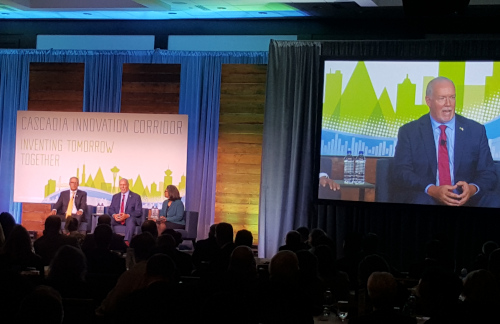SUBSCRIBE TO THE FREE NEWSLETTER
At the Cascadia Innovation Corridor conference
Seattle was host to the Cascadia Innovation Corridor conference this week, a meeting of government leaders, techie bigwigs, and various business leaders intent on increasing ties between British Columbia and Washington (Oregon seems a bit forgotten in the mix, not to mention Idaho, but I digress…). There’s plenty of good stuff happening here, as leaders work to push for a regional high speed rail network, increase cooperation between tech companies and research institutions in the region, and cooperate on cross-border environmental issues.
WA governor Jay Inslee and BC premier John Horgan announced a new effort to create cross-border green electric grid, but absent was any mention of the BC government’s support for a massive natural gas export terminal on the north coast, or the continued clear-cut logging of old growth forests in British Columbia. Although props to Horgan for acknowledging that the north-south connection between BC and WA seems to be gaining importance over ties to Ottawa, 3,000 km to the east, which often “seems more like 3 light years away,” he said.
There was a relatively engaging discussion of Cascadia media issues involving Farhan Mohamed, the editor-in-chief of Vancouver news site Daily Hive, and John Cook, co-founder of the Seattle-based tech news site GeekWire. Clearly, the region needs to do better brand itself and increase communication throughout the region, but the panel seemed at times to over-simplify thorny issues such as housing and homelessness.
Over at the Stranger, Gregory Scruggs has a nice take on the whole Cascadia Corridor phenomenon: yeah, the mucketymucks meeting and talking about super fast trains is nice and all, but the experimental and techno music scene in Seattle, Vancouver, and beyond is actually creating some really amazing cross-border stuff worth paying attention to.
Oh, and by the way “mucketymuck” has a long tradition in Cascadia. It comes from “muckamuck,” which means “high chief” in the Chinook jargon, the language used to facilitate communication between Indigenous people and white colonizers in the early 19th century.
–Andrew Engelson
31 Days, 31 Writers at Cascadia Magazine: Danika Dinsmore
The proposed expansion of the Trans Mountain pipeline across British Columbia has inspired protests from a wide range of people in Cascadia. BC poet Rita Wong recently served a 28-day sentence for a protest in Burnaby, and poet, activist and spoken word artist Danika Dinsmore wrote about her experience being arrested and sentenced in “House Arrest” at Cascadia Magazine. It’s an impassioned plea for action on climate change.
If you appreciate passionate writing like this about issues of importance to the Pacific Northwest, please take a moment to show your support for Cascadia Magazine during our Fall Fund Drive. Your support helps us continue to publish great writing on issues that matter in the Cascadia bioregion.
What to do about polluting Seattle recycling plant?
Investigate West has a great feature by Robert McClure looking at the complicated story of a Seattle glass recycling plant run by the Ardagh corporation that’s the single biggest emitter of soot pollution in the Puget Sound region. What to do about a major polluter that’s also recycling most of Seattle’s glass, and employs more than 300, many of them people of color?
BC legislature official resigns as investigation continues
The Tyee reports that the sergeant-at-arms of the BC legislature has resigned as the RCMP continues to investigate profligate spending by officials in charge of managing the legislative process. CBC has more background on on the scandal,
Jess Walter: Spokane election about new and old views
Writing for the Inlander, novelist and Spokane resident Jess Walter says the upcoming city election for mayor and city council is between those who have a conservative, nostalgic vision of Spokane as a quiet backwater and those who’ve been doing the work to build Spokane into the vibrant, complicated, and economically thriving city it’s now become. In other election news, Missoula businesswoman Whitney Williams is the fourth Democratic candidate to announce a run for Montana governor.
Washington finally addresses marbled murrelet habitat
Seattle Weekly reports that the Washington state Department of Natural Resources has come up with a plan to protect habitat for the marbled murrelet, an endangered pelagic bird that builds its nests in old-growth timber. The plan would increase protection of some 37,000 acres of state forests, but timber companies aren’t happy about the proposal.
A film about abuse and the silence that supports it
Carolyn Blick at the South Seattle Emerald interviews filmmaker Baljit Sangra, whose new documentary Because We Are Girls looks at sexual assault by trusted family members, and how a patriarchial culture of silence in Punjabi immigrant culture can make it extremely difficult to bring these cases to light. “You always thought the family honor rested on you. I remember that now. On the girls. And a girl who had somehow dishonored her family was like a huge deal.” The film screens at Seattle Tasveer film festival this weekend on Oct 5, more info can be found here.
Two poems by Susan Kay Anderson
At Cathexis Northwest Press, you’ll find two poems by Eugene, Oregon poet Susan Kay Anderson, including “Wanting Your Every“…
“Wanting your every weekend thought
the weekdays filled to the brim
the new sun overwhelming
splitting tulips their sleeping bees
now awake and circling
drowsy like capsules of mown grasses”
Read the full poems here.
That’s this evening’s grab bag assortment of environmental news, arts, poetry, and other stuff from across the Great Northwest. If you like what you read at Cascadia Daily, please help us continue to publish during our Fall Fund Drive. Seriously. We can’t keep doing this without your financial help. Thanks! –Andrew Engelson

